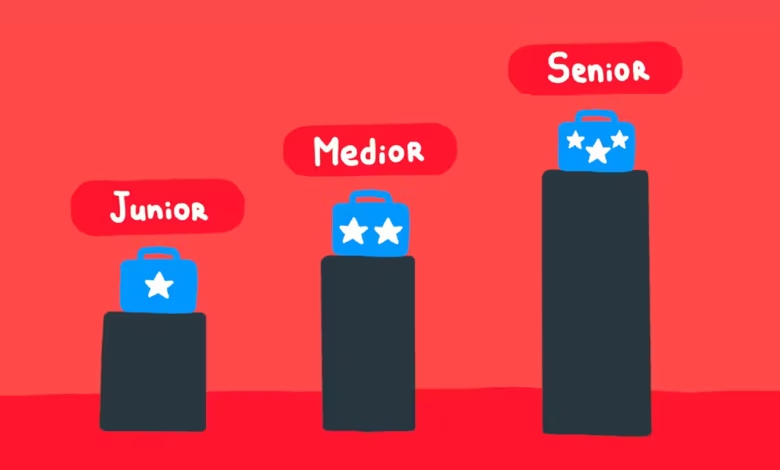From Junior to Senior in the Programming World: A Step-by-Step Developer’s Journey

There comes a moment for every programmer when they pause and ask themselves:
“Am I still a Junior? When will I truly become a Senior?”
If that question has ever crossed your mind, you’re on the right path. But here’s the truth: this transformation isn’t about how many years you’ve worked — it’s a journey of awareness, understanding, responsibility, and growth.
Let’s walk through it together — step by step — from the very beginning until you become a developer that companies fight over.
🚼 Stage One: The Fresh Junior — Still Crawling
How you look at this stage:
-
You write code that works — whether it’s clean or messy (spaghetti code? Who cares!).
-
Google and Stack Overflow are your lifelines.
-
You don’t really understand why the code works — you just copy it from a course or tutorial.
-
When bugs happen, you try random solutions until something works.
-
Working on existing projects feels overwhelming and confusing.
And that’s perfectly okay.
We all start here. The key is recognizing that you’re just at the beginning — and not rushing the process.
You’re not lacking talent — you’re just lacking maturity.
And that maturity comes from two things: consistent practice and real-world challenges.
🧠 Stage Two: The Developer Who Starts to “Understand”
What begins to change:
-
You start asking why, not just how.
-
You appreciate clean code and explore principles like SOLID and Design Patterns.
-
Bugs don’t scare you — you analyze before fixing.
-
You understand the business logic behind the code.
-
You’re curious about architecture choices and ask why certain decisions were made.
At this stage, you’re no longer just following orders — you’re becoming a conscious developer.
You pay attention to the details, which sets you apart from others still stuck in copy-paste mode.
💡 Stage Three: The Mid-Level Dev Who Builds Thoughtful Solutions
Now, people describe you as someone who “gets it”, not just someone who’s technically skilled.
Here’s what sets you apart:
-
You see the big picture — not just your piece of the code.
-
You understand performance, scalability, and security.
-
When you suggest solutions, you weigh the trade-offs.
-
You mentor junior developers and explain things clearly.
-
You review others’ code with a sharp, constructive eye.
What matters here:
You’re becoming a valuable team member.
People enjoy working with you — not just because you’re skilled, but because you’re responsible, confident, and supportive.
🦾 Stage Four: The True Senior Developer — More Than Just a Title
Being a Senior doesn’t mean you’re the smartest.
It means you’re the most mature, reliable, and influential.
How you show up:
-
You manage your time and anticipate issues before they happen.
-
You design systems and build scalable architectures.
-
You balance code quality with delivery speed.
-
You value communication as much as coding.
-
You help everyone around you grow.
And here’s the real difference:
A Senior Developer isn’t the one who fixes everything alone —
They’re the one who makes the whole team better by being part of it.
🎯 So… How Do You Reach That Level?
-
Don’t rely on courses alone
Real learning comes from doing — real projects, production issues, actual teamwork.
Get an internship, contribute to projects, or work in a real environment. -
Write code that others can read
Think about the next developer after you.
Code isn’t just about working — it’s about being understandable. Use clear logic, meaningful names, and good comments. -
Talk to your team — and understand the business
Don’t just be a “code translator.” Always ask:
“What does the client actually want? How can we deliver it simply?” -
Read senior developers’ code
Observe how they think, how they structure projects, and how they solve complex issues. -
Build your own project
It will teach you how to plan, build, troubleshoot, and grow as a developer.
📊 Is It All Just Technical? Of Course Not.
Some of the most important skills for a professional developer aren’t technical.
Soft skills you need to grow:
-
Explain complex ideas simply.
-
Handle both positive and negative feedback.
-
Use feedback to improve.
-
Work respectfully and flexibly within a team.
💼 And What About the Job Market?
The market isn’t just looking for someone who writes code.
It’s looking for someone who can:
✅ Understand business goals
✅ Solve real problems
✅ Collaborate smoothly with a team
✅ Learn and grow continuously
📌 In Summary:
If you’re a Junior right now — that’s not the end. It’s just the beginning.
If you’re starting to think bigger, trying to understand why behind the code, and care about the bigger picture — you’re already on the road to becoming a pro.
And never forget:
“The difference between an average developer and a great one isn’t in how many lines of code they write — it’s in how they think.”
Final Thoughts
Never underestimate yourself.
Every Senior today was a Junior once.
What made the difference is that they knew where they were going, and they worked on themselves with intention.
Start now.
Grow step by step.
And never put a limit on your potential.
Because you can — and you deserve your place. Just walk the path right. 💪




